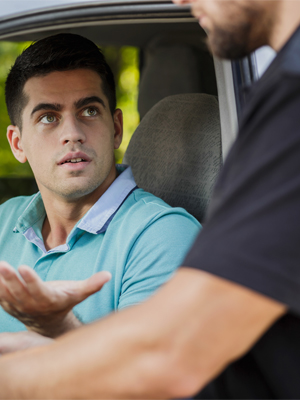 With the amount of time people spend on the road, we are all at risk of breaking a road rule at some stage or another.
With the amount of time people spend on the road, we are all at risk of breaking a road rule at some stage or another.
It is important to understand that breaking road rules can have serious consequences for you and your family. Penalties for traffic offences can range from receiving a fine, incurring demerit points, a probation order, losing your licence, or even going to jail. The penalty will depend on the type of offence you have been charged with, the circumstances around the offending, and your traffic history.
Speeding laws
You can be caught speeding by any of the following methods:
- On-road police
- Fixed speed cameras
- Mobile speed cameras
- Point-to-point speed cameras
- Combined speed and red-light cameras.
If you are caught speeding, you will usually be ordered to pay a fine and demerit points will be recorded on your traffic history. If you are caught driving at excessive speed and/ or a repeat offender, you may be at risk of losing your licence.
Drink and drug driving laws
Drink and drug driving laws are enforced by:
- Breath tests—to check your alcohol level
- Saliva tests—to check for illegal drugs.
The Police carry out breath and saliva tests and they can be either random or targeted.
If you return a positive drink or drug driving test the Police will suspend your licence for 24 hours and they can also confiscate or impound your car. If you’re caught drink driving, you will have to go to court. The Police will issue with a notice to appear in local Magistrates Court.
A magistrate will decide the length of your licence disqualification and whether you will be fined or sentenced to a term of imprisonment.
The severity of the penalty will depend on your:
- Blood/breath alcohol concentration (BAC) at the time of the offence
- Traffic history, including whether you have been previously convicted of a drink driving offence.
Drink and drug driving offences are to be taken seriously, particularly when you have a high reading and/or have previously been convicted of a drink or drug driving charge.
If you are pleading guilty to any sort of charge of drink or drug driving, you will lose your licence. You may be able to apply for a work licence. There is no other special licence that you can get no matter how much you need a licence or how good your reasons are. The Court will only give you work licence to allow you to get to and from work.
Applying for a work licence
-
What is a work licence?
A work licence allows you to drive for work even though your normal driver licence has been cancelled because of drink driving or a similar offence. A work licence is officially called “a restricted licence under section 87 of the Transport Operations (Road Use Management) Act 1995”.
-
How do I get a work licence?
You need to apply to the court for an order for a work licence. A magistrate will consider your application and decide if you qualify for a work licence. A magistrate can put conditions on the work licence, like the times and purposes for which you can drive. You cannot automatically get a work licence because you need your licence for work. There are strict criteria and the magistrate can refuse your application if they are not satisfied that you are a fit and proper person to hold a restricted licence.
It doesn’t matter how much you need your licence, or how good your reasons are, if you don’t need it to keep your job, the court cannot give you any type of licence.
You may be eligible for a work licence if:
- You have been charged with drink driving, fail to provide a sample of breath at the roadside, or driving with a relevant drug in the blood or saliva (but not driving under the influence of alcohol or drugs or fail to provide a specimen of breath at the police station);
- You are going to plead guilty and are going to lose your driver licence, and
- You need your driver licence for work.
Special Hardship Order
-
What is a special hardship order?
A special hardship order is an order granted by the Magistrates Court that lets you drive under special conditions even though your normal driver licence has been suspended.
To obtain this order you need to apply to the court in writing. A magistrate can put conditions on the order, like the times and reasons for which you can drive. The order will apply until your licence suspension period ends.
You are not automatically entitled to a special hardship order because you need your licence for work or study or for some other reason. There are strict criteria and the magistrate can refuse your application even though you meet the criteria to apply because the magistrate does not think you are a fit and proper person to hold a licence.
You may be eligible for a special hardship order if your licence has been (or is about to be) suspended because:
- You have been charged with driving more than 40 km over the speed limit (referred to as a ‘high speed offence’); or
- More than one demerit point is allocated to your traffic history while you were driving during a 12-month good behaviour period; or
- You have been charged with driving more than 40km over the speed limit and you have more than one demerit point allocated to your traffic history while you were driving during a 12-month good behaviour period (dual suspension); and
- You need your licence to either to do your job, or to get to and from work or study, or for another special reason.
-
Driving without a licence
Driving without a licence is an offence. If you drive a motor vehicle while you do not hold a valid driver licence you may receive an infringement notice or be dealt with by a court for unlicensed driving.
You do not hold a valid driver licence if:
- Your driver licence has expired, and you have not renewed it;
- You have voluntarily surrendered your driver licence;
- Your Queensland driver licence has been suspended or cancelled because you are medically unfit to hold a driver’s licence;
- You do not hold the class of licence for the vehicle you are driving;
- You have never held a driver licence;
- Your driver licence has been suspended because of an accumulation of demerit points or a high-speed offence;
- Your driver licence has been immediately suspended or you have been immediately disqualified following a drink-driving or drug-driving offence;
- Your driver licence has been suspended by the State Penalties Enforcement Registry because you have outstanding fines;
- You have been disqualified from holding or obtaining a driver licence; or
- After completing a period of disqualification, you do not obtain a further driver licence before starting to drive again.
- If you drive a motor vehicle without a licence you could receive an infringement notice or be dealt with by a court for unlicensed driving.
- If you are convicted of unlicensed driving the court may give you a maximum fine amount, or you may be imprisoned for up to 1 year.
-
Disqualified driving
If you are convicted of any of the following offences you will be disqualified from holding a driver licence for a certain period by a Court:
- A drink or drug driving offence
- A dangerous driving offence
- A criminal offence involving the driving or use of a motor vehicle.
If you then drive a motor vehicle in Queensland while disqualified from holding a driver licence, you will be dealt with by a court for disqualified driving.
A conviction for disqualified driving is serious because you will face a mandatory period of disqualification of your driver licence for an additional period of at least 2 years – up to a maximum of 5 years. You may also receive a maximum fine or be imprisoned for up to 18 months.
-
Driving without due care and attention
A person who drives a motor vehicle without due care and attention commits an offence and can be fined up to $4712 or imprisoned for up to six months under section 83 of the Transport Operations (Road Use Management) Act 1995 (Qld).
Due care and attention is the lessor offence of a charge of dangerous driving. “Due care and attention” means the degree of care and attention that a reasonable and prudent driver would exercise in the circumstances.
Drivers are often charged with this offence as an alternative or in addition to a more specific charge, such as driving through a red light or crossing a double centre line. This is particularly so when the act complained of poses some risk to other road users rather than being merely a technical breach of the law. When a person is found guilty of this offence, the disqualification of their licence is not automatic but can occur.
-
Dangerous driving
A person who operates a vehicle dangerously commits a criminal offence under section 328A of the Criminal Code Act 1899.
The legislature and the courts view dangerous driving as a very serious offence because of the potential harm dangerous driving can do to others. An automatic minimum six-month period of disqualification from driving applies when a person is convicted of operating a vehicle dangerously.
Dangerous driving is an indictable offence that must be dealt with summarily in the Magistrates Court. The maximum penalty is a $23 560 fine and/or three years imprisonment. Where a person commits the offence under the influence of alcohol while racing or excessively speeding, or where they have previously been convicted of the same offence, the charge is dealt with summarily in the Magistrates Court unless the person elects for a trial by jury to be dealt with in the District Court.
In the District Court, they are liable to a fine of $47 120, or five years imprisonment.
If the driving has caused death or grievous bodily harm to another person, a magistrate cannot try the case and the matter must be dealt with by the District Court. The maximum penalty is 10 years imprisonment, and if they were affected by drugs or alcohol at the time, excessively speeding or taking part in an unlawful race or speed trial, they are liable to a maximum of 14 years imprisonment. A person is also liable to 14 years imprisonment if they leave the scene of an accident before police arrive if they reasonably ought to know that someone has been killed or injured.
In certain circumstances, the court must impose a term of imprisonment (e.g. where a person has been twice previously convicted of the offence).
Getting a lawyer to help you deal with your traffic offences will put you in the best position to get a favourable court outcome and help you keep your licence.
